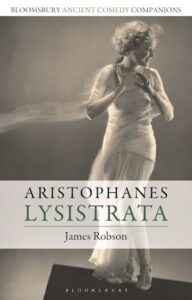This month sees the publication of Aristophanes: Lysistrata by James Robson, Professor of Classical Studies at the Open University. Lysistrata is a comedy from Classical Athens about a fictional sex strike staged by the women of Greece which brings about the end of a bitter war.
In this post, James recalls his first encounter with the play and contemplates the play’s enduring appeal.
 My first encounter with Aristophanes’ Lysistrata was as a first-year undergraduate as part of a Greek and Roman Drama module, and I can safely say it was love at first sight. We studied tragedy for the first semester, and as exciting and profound as Aeschylus, Sophocles and Euripides’ plays were for me at the time, I found myself impatiently waiting for Christmas to be over when all the secrets of Greek comedy would finally be revealed to me. The twinkle in my lecturer’s eye whenever he said the name ‘Aristophanes’ was intriguing enough, but it was the rumours I heard from fellow students about Aristophanes’ anarchic, sassy, quick-fire plays with their countless willy, bum and fart jokes that threatened to send me over the edge. Greek Comedy sounded mind-blowing and my mind could hardly wait to be blown.
My first encounter with Aristophanes’ Lysistrata was as a first-year undergraduate as part of a Greek and Roman Drama module, and I can safely say it was love at first sight. We studied tragedy for the first semester, and as exciting and profound as Aeschylus, Sophocles and Euripides’ plays were for me at the time, I found myself impatiently waiting for Christmas to be over when all the secrets of Greek comedy would finally be revealed to me. The twinkle in my lecturer’s eye whenever he said the name ‘Aristophanes’ was intriguing enough, but it was the rumours I heard from fellow students about Aristophanes’ anarchic, sassy, quick-fire plays with their countless willy, bum and fart jokes that threatened to send me over the edge. Greek Comedy sounded mind-blowing and my mind could hardly wait to be blown.
 Reality hit hard, however, when we finally got to the plays themselves. Greek comedies were like nothing I had ever encountered before, it’s true, but that actually made them tough to read. Plots didn’t always progress logically, and Aristophanes’ stylistic switches and linguistic exuberance could often be difficult to make sense of. Most disappointingly of all – the fantastic willy gags aside – the jokes were often challenging to appreciate, designed as they were for a particular audience, in a particular time and place, and therefore referencing people, events, conventions and objects that were often unfamiliar to me. I desperately wanted to ‘get’ Greek Comedy, but was struggling to find an Aristophanic play to fall in love with. That is, until I found Lysistrata.
Reality hit hard, however, when we finally got to the plays themselves. Greek comedies were like nothing I had ever encountered before, it’s true, but that actually made them tough to read. Plots didn’t always progress logically, and Aristophanes’ stylistic switches and linguistic exuberance could often be difficult to make sense of. Most disappointingly of all – the fantastic willy gags aside – the jokes were often challenging to appreciate, designed as they were for a particular audience, in a particular time and place, and therefore referencing people, events, conventions and objects that were often unfamiliar to me. I desperately wanted to ‘get’ Greek Comedy, but was struggling to find an Aristophanic play to fall in love with. That is, until I found Lysistrata.
So, what is it that made my heart beat faster when I first read this play? You could say that I’ve been working on that question ever since, and that writing this book has finally allowed me to figure out the answer.
To help me explain, it’s worth outlining the context in which Lysistrata was written. It was first staged in 411 BCE during what was perhaps classical Athens’ darkest hour. The city had recently lost thousands of men in the disastrous Sicilian Expedition and was now at serious risk of losing the Peloponnesian War which it had been fighting against Sparta for 20 years. With Lysistrata, Aristophanes presents his audience with a wonderful fantasy of how peace could be attained by the women of Greece staging a sex strike and thereby forcing the men to reconcile their differences and bring the fighting to an end. In his play, Aristophanes freely acknowledges the rough time Athens was having (as mentioned above, comedy as a genre is deeply concerned with the here and now of life in the city of Athens, so this stark reality could hardly be avoided). But importantly, the plot enables him to explore the effects of war from a viewpoint that his predominantly male audience might rarely have considered, namely that of the city’s womenfolk. This makes the play fresh, innovative and arguably more contemporary-feeling for a modern audience inclined to see a non-traditional viewpoint as refreshing. Indeed, Lysistrata was very possibly the first Greek comedy to feature an ordinary, citizen woman as its central character. At this stage in his career Aristophanes was clearly a mature and accomplished playwright who felt confident with experimentation.
The challenging historical backdrop to the play helps us to understand other features of the play that made it more accessible to me as an undergraduate. The intense turmoil in Athens in 411 BCE led to a toxic political situation, which later that year would result in a bloody coup. Wisely, then, Aristophanes dials down the kind of contemporary political jokes and the topical allusions which modern readers struggle with, and instead we get a whole bunch of first-rate willy gags that have stood the test of time. As I just mentioned, too, he also experiments with the genre of comedy: Lysistrata’s characters are more psychologically convincing than the more changeable creations of his earlier plays, their language is more uniform, and the plot – as fantastic and silly as it is at times – nevertheless has its own logical flow. In short, the play’s universal themes – sex, war, gender, protest – its characters, its language and its humour are simply all more comprehensible to a non-specialist than those of other comedies by Aristophanes. And this, I think, is what helped not just the undergraduate version of me fall in love with Lysistrata, but why the play has been so influential in modern times, too. As I outline in the book, Lysistrata has been widely read and performed in English-speaking countries over the last 150 years – perhaps more widely than all the rest of Aristophanes’ plays put together – and has even inspired feature films (Spike Lee’s 2015 Chi-raq is a recent example). In short, Lysistrata has proven to be a deeply seductive play – not just for me, but for many others, too. And writing this book has not only allowed me to explore the nature of its allure, but also to share its seductive secrets with others.
Aristophanes: Lysistrata by James Robson is published by Bloomsbury.
Read more about James’ teaching and research at the Open University here.